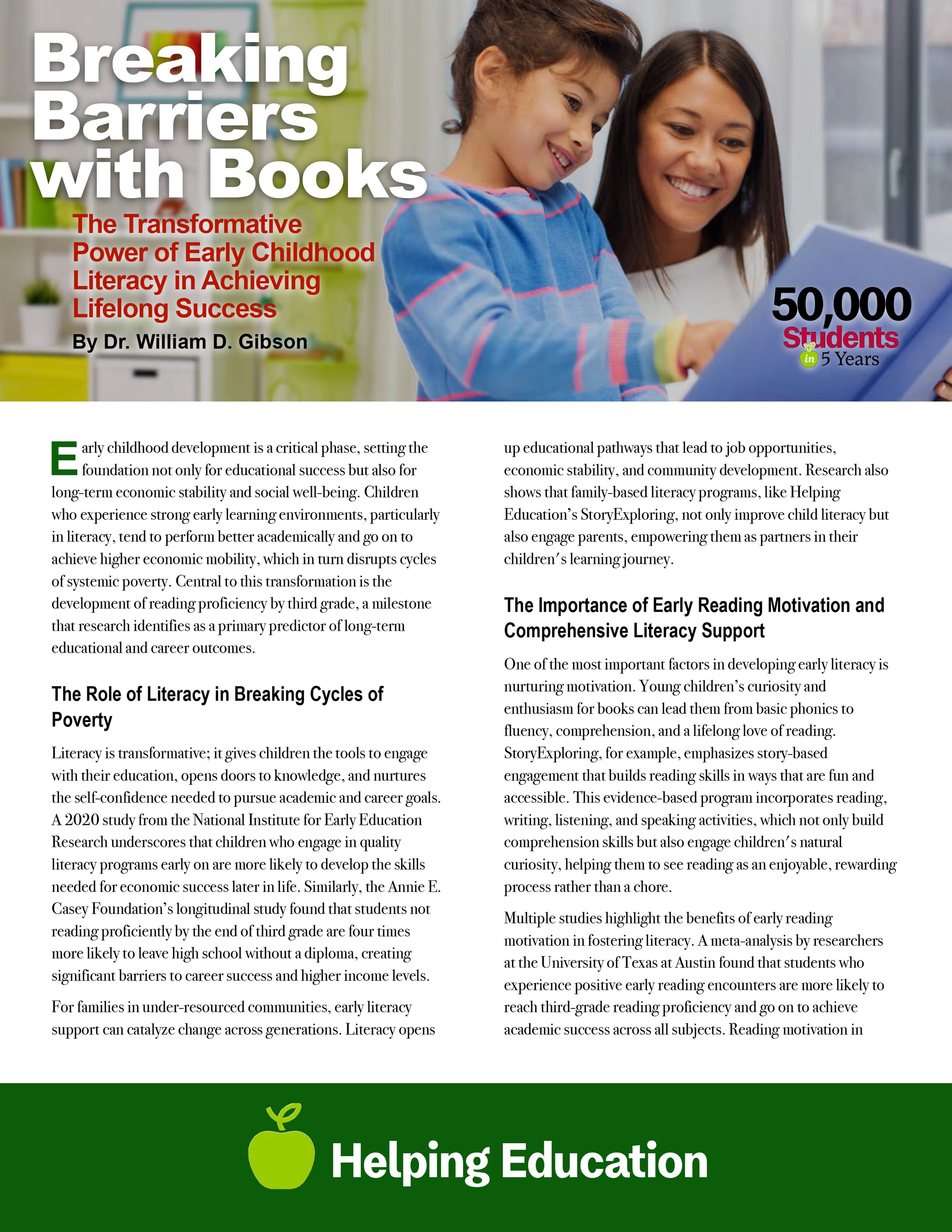Breaking Barriers with Books: The Transformative Power of Early Childhood Literacy in Achieving Lifelong Success
Early childhood development is a critical phase, setting the foundation not only for educational success but also for long-term economic stability and social well-being. Children who experience strong early learning environments, particularly in literacy, tend to perform better academically and go on to achieve higher economic mobility, which in turn disrupts cycles of systemic poverty. Central to this transformation is the development of reading proficiency by third grade, a milestone that research identifies as a primary predictor of long-term educational and career outcomes.
The Role of Literacy in Breaking Cycles of Poverty
Literacy is transformative; it gives children the tools to engage with their education, opens doors to knowledge, and nurtures the self-confidence needed to pursue academic and career goals. A 2020 study from the National Institute for Early Education Research underscores that children who engage in quality literacy programs early on are more likely to develop the skills needed for economic success later in life. Similarly, the Annie E. Casey Foundation’s longitudinal study found that students not reading proficiently by the end of third grade are four times more likely to leave high school without a diploma, creating significant barriers to career success and higher income levels.
For families in under-resourced communities, early literacy support can catalyze change across generations. Literacy opens up educational pathways that lead to job opportunities, economic stability, and community development. Research also shows that family-based literacy programs, like Helping Education’s StoryExploring and BABY (Birth and Beyond Years), not only improve child literacy but also engage parents, empowering them in their children's learning journey.
The Importance of Early Reading Motivation and Comprehensive Literacy Support
One of the most important factors in developing early literacy is nurturing motivation. Young children’s curiosity and enthusiasm for books can lead them from basic phonics to fluency, comprehension, and a lifelong love of reading. StoryExploring, for example, emphasizes story-based engagement that builds reading skills in ways that are fun and accessible. This evidence-based program incorporates reading, writing, listening, and speaking activities, which not only build comprehension skills but also engage children's natural curiosity, helping them to see reading as an enjoyable, rewarding process rather than a chore.
Multiple studies highlight the benefits of early reading motivation in fostering literacy. A meta-analysis by researchers at the University of Texas at Austin found that students who experience positive early reading encounters are more likely to reach third-grade reading proficiency and go on to achieve academic success across all subjects. Reading motivation in young learners, combined with focused instruction on phonics and comprehension, accelerates their transition from “learning to read” to “reading to learn," enabling them to engage more critically with content.
The Science of Third-Grade Reading Proficiency
Third grade is a critical juncture in literacy because it marks the shift from learning to read to reading to learn. At this stage, children are expected to use reading as a tool for understanding broader subject areas. A 2018 report from the Brookings Institution emphasizes the importance of third-grade reading proficiency as an indicator of future academic performance and career outcomes. Children who meet this benchmark are more likely to graduate high school on time, pursue post-secondary education, and secure employment with higher earning potential.
StoryExploring supports this transition by fostering reading motivation, critical thinking, and problem-solving. Its targeted, evidence-based approach gives children the foundational skills they need to learn to read independently and confidently, setting them on a successful trajectory from motivation and phonics to fluency and comprehension. Additionally, by involving families in the literacy journey, Helping Education promotes a culture of reading within the home, which studies have shown to be one of the most impactful factors in developing lifelong readers.
Why Literacy Programs Like StoryExploring Matter for Community Transformation
Early literacy is not just an educational tool; it’s a cornerstone for social change. By equipping children with reading skills, programs like StoryExploring lay the groundwork for economic stability and community empowerment. Research from the Center on the Developing Child at Harvard University finds that early educational interventions lead to measurable improvements in long-term income and well-being for both children and their families. For parents, these programs offer resources, support, and strategies that enable them to actively contribute to their children’s success, breaking down barriers to educational equity.
With programs like StoryExploring and BABY, Helping Education ensures that children not only learn to read but also develop a love for it, motivating them to continue engaging with learning in all forms. It’s through this transformative approach that literacy becomes more than a skill; it becomes a vehicle for personal and community growth. Early literacy intervention provides children with the foundational tools they need to succeed and inspires families to dream beyond generational limitations, catalyzing a brighter, more equitable future.

